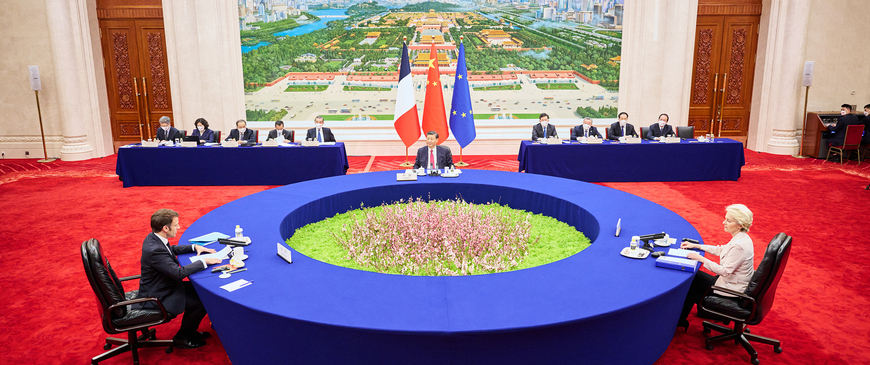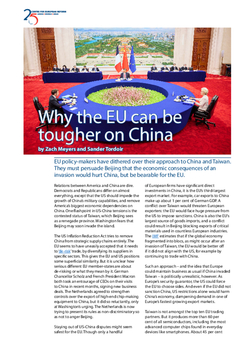
Why the EU can be tougher on China
EU policy-makers have dithered over their approach to China and Taiwan. They must persuade Beijing that the economic consequences of an invasion would hurt China, but be bearable for the EU.
Relations between America and China are dire. Democrats and Republicans differ on almost everything, except that the US should impede the growth of China’s military capabilities, and remove America’s biggest economic dependencies on China. One flashpoint in US-China tensions is the contested status of Taiwan, which Beijing sees as a renegade province. Washington fears that Beijing may soon invade the island.
The US Inflation Reduction Act tries to remove China from strategic supply chains entirely. The EU seems to have uneasily accepted that it needs to ‘de-risk’ trade, by diversifying its suppliers in specific sectors. This gives the EU and US positions some superficial similarity. But it is unclear how serious different EU member-states are about de-risking or what they mean by it. German Chancellor Scholz and French President Macron both took an entourage of CEOs on their visits to China in recent months, signing new business deals. The Netherlands agreed to strengthen controls over the export of high-end chip-making equipment to China, but it did so reluctantly, only at Washington’s urging. The Netherlands is now trying to present its rules as non-discriminatory so as not to anger Beijing.
Staying out of US-China disputes might seem safest for the EU. Though only a handful of European firms have significant direct investments in China, it is the EU’s third-largest export market. For example, car exports to China make up about 1 per cent of German GDP. A conflict over Taiwan would threaten European exporters: the EU would face huge pressure from the US to impose sanctions. China is also the EU’s largest source of goods imports, and a conflict could result in Beijing blocking exports of critical materials used in countless European industries. The IMF estimates that if the global economy fragmented into blocs, as might occur after an invasion of Taiwan, the EU would be better off if it did not align with the US, for example by continuing to trade with China.
Such an approach – and the idea that Europe could maintain business as usual if China invaded Taiwan – is politically unrealistic, however. As Europe’s security guarantor, the US could force the EU to choose sides. And even if the EU did not sanction China, US restrictions alone would harm China’s economy, dampening demand in one of Europe’s fastest growing export markets.
Taiwan is not amongst the top ten EU trading partners. But it produces more than 60 per cent of all semiconductors, including the most advanced computer chips found in everyday devices like smartphones. About 45 per cent of the EU's chip imports come from China or Taiwan. A conflict would seriously disrupt these supply chains, depriving Europe’s manufacturing industries of an indispensable input, and stifling Europe’s access to digital technology. Although several European countries are subsidising their own local chip-making facilities and trying to mine critical raw materials locally to mitigate the risk of losing supplies, these efforts will take many years to become commercially viable.
The EU would therefore benefit if the Chinese economy was not walled off, or only in a limited way. That outcome is most likely if the EU successfully deters China from an invasion by aligning more closely with the US now.
The EU should learn from its experience with Russia. Deep trade ties did not dissuade Russia from invading Ukraine for two reasons. First, Putin bet that the EU did not have the political will or unity to impose far-reaching sanctions. Second, Putin wrongly thought that the EU would need cheap Russian energy supplies more than Russia would need European imports. China now understands that the EU is not afraid of imposing sanctions on large trade partners. To convince China not to invade Taiwan, however, European partners must persuade Beijing that the economic consequences of an invasion would hurt China more than the EU.
The EU’s current approach is seemingly to try to minimise the costs of any China-Taiwan conflict for Europe, by pursuing its de-risking strategy. However its on-shoring and friend-shoring strategy faces many hurdles: it will take many years to achieve results, with higher costs and less efficiency. For example, the EU’s efforts to mine or recycle more critical minerals in Europe involve environmental, technological and economic challenges that will take years to resolve. Europe also wants to conclude free trade agreements to increase imports of raw materials from countries other than China. But many of these agreements would be with countries such as Australia that have high production costs - which will not convince many European firms to diversify away from China.
So far, the EU has only targeted direct imports from China. Diversification risks making dependencies more hidden and indirect, however. For example, the EU might diversify sources of a particular import, such as refined rare earths, but that will not help if its new suppliers acquire their unrefined inputs from China. Although the EU quickly replaced Russian fossil fuels imports, China is far more embedded in European industrial value chains. De-risking effectively will prove far more complex and take longer than the EU has acknowledged. Yet many experts expect that, if China invades Taiwan, it will do so within a few years.
To reduce the EU’s dependency on China and Taiwan, EU institutions recently struck a deal for billions in subsidies to the chip sector to double Europe’s global market share to 20 per cent by 2030. But the EU has only committed limited new funds to this goal, and analysts question whether the EU’s ambitions are realistic. Even if EU production of chips increases, the Union will struggle to import enough inputs into the chip supply chain from outside China to keep pace: so the EU may become even more dependent on Beijing. Moreover, US and Asian countries are lavishing their own subsidies on local chip production, which means Europe will be competing in a subsidy race that not everyone can win.
Europe ought to consider an alternative approach: making the consequences of a conflict more painful for China, rather than less painful for Europe. In some cases, as China’s economy has developed, it has started to replace high-value European manufactured products with domestic substitutes. A large proportion of EU exports to China are cars, for example: but that is likely to fall given the rocketing growth in China’s electric vehicle production. European car-makers facilitated this development by relocating some production to China to serve the local market and to meet local content requirements, in order to qualify for Chinese subsidies. Europe’s slow loss of complex, high-end industrial processes to China suggests Europe might benefit from moving somewhat closer to Washington’s approach to deterring an invasion. This would include a mix of increasingly severe export controls, cutting government support for new European investment in China, and requiring government approval for such outgoing investments, thereby hindering China’s technological advancement and keeping it more dependent on the West.
The US approach is not risk-free. It will encourage China to accelerate the indigenisation of technology. But China’s business model relies heavily on Europe’s large and wealthy consumer market, and Beijing also desperately wants a fragmented West. That means Beijing will be reluctant to retaliate against Europe so long as the EU remains even mildly more open to China than the US.
Zach Meyers is a senior research fellow and Sander Tordoir is senior economist at the Centre for European Reform.

